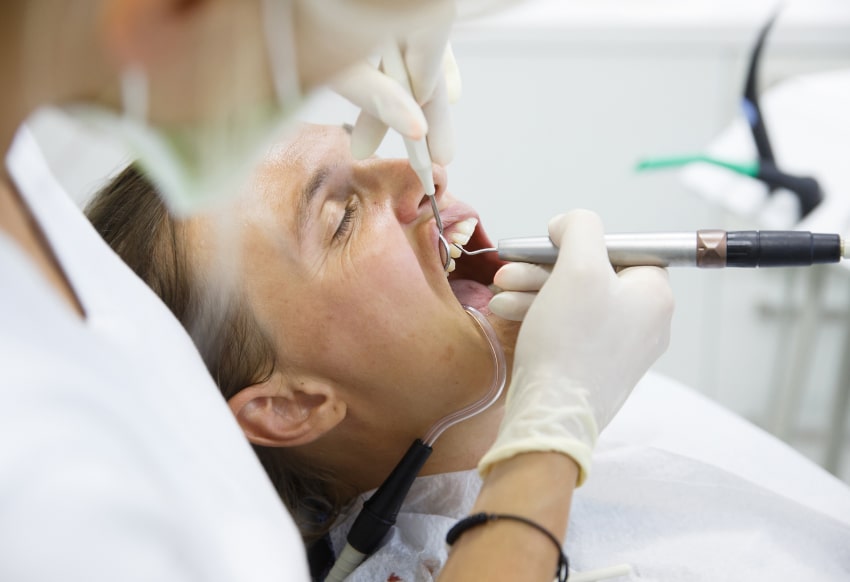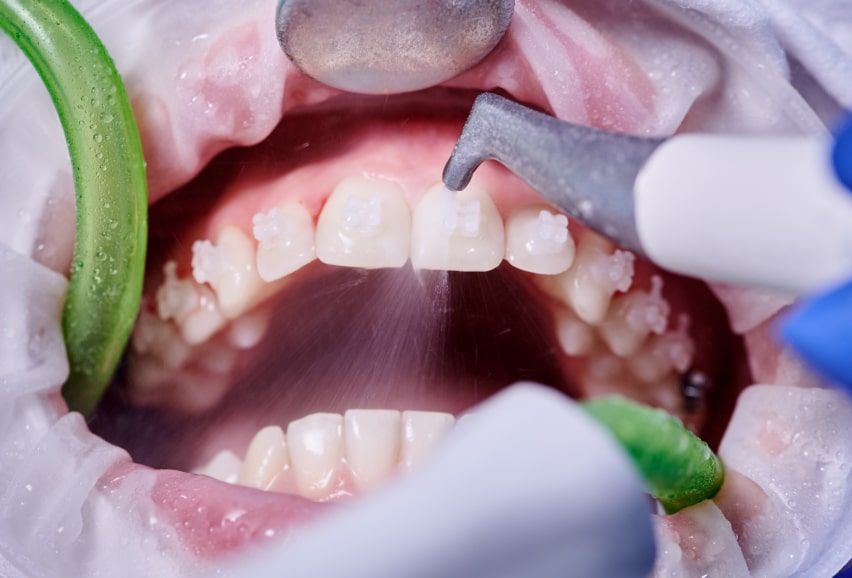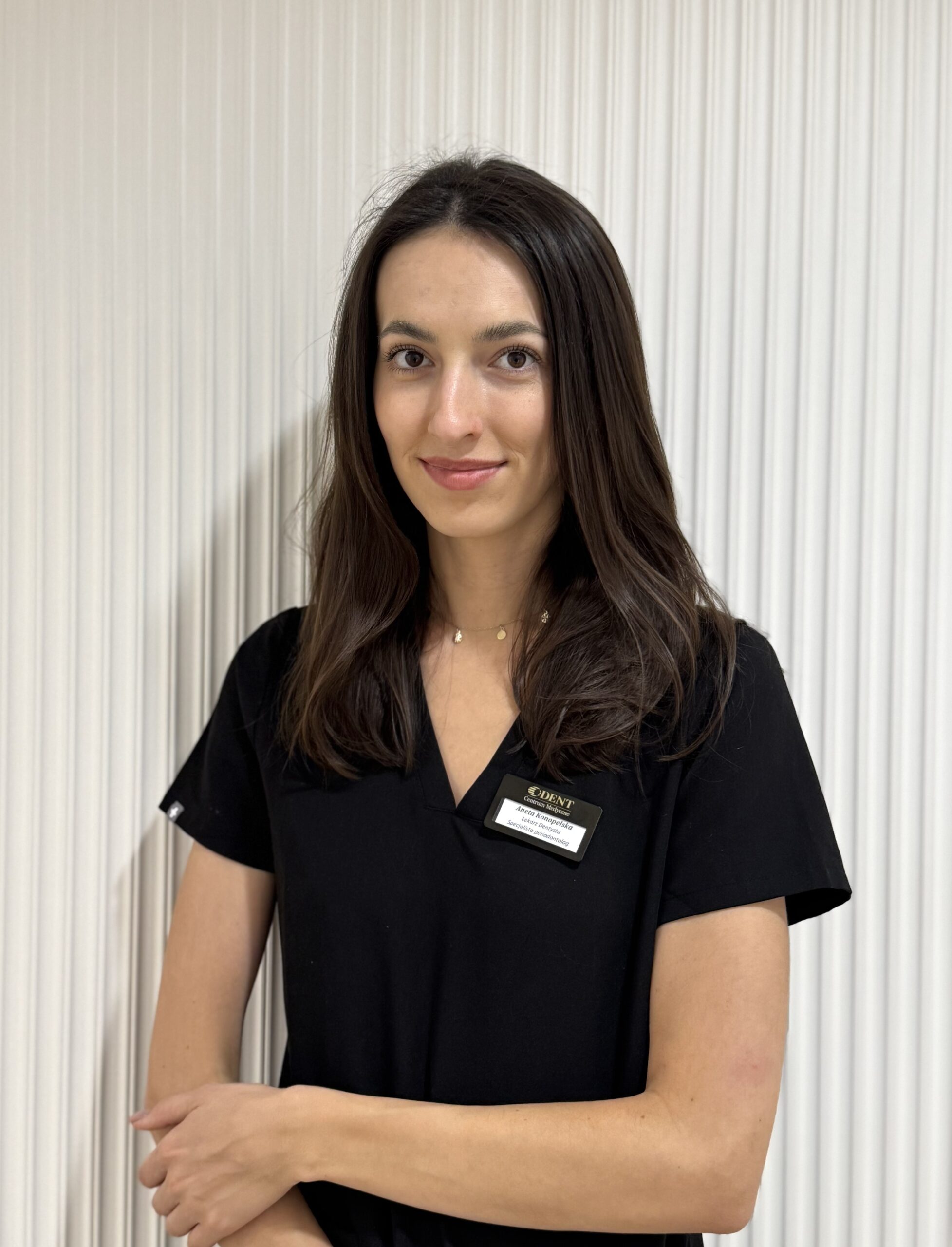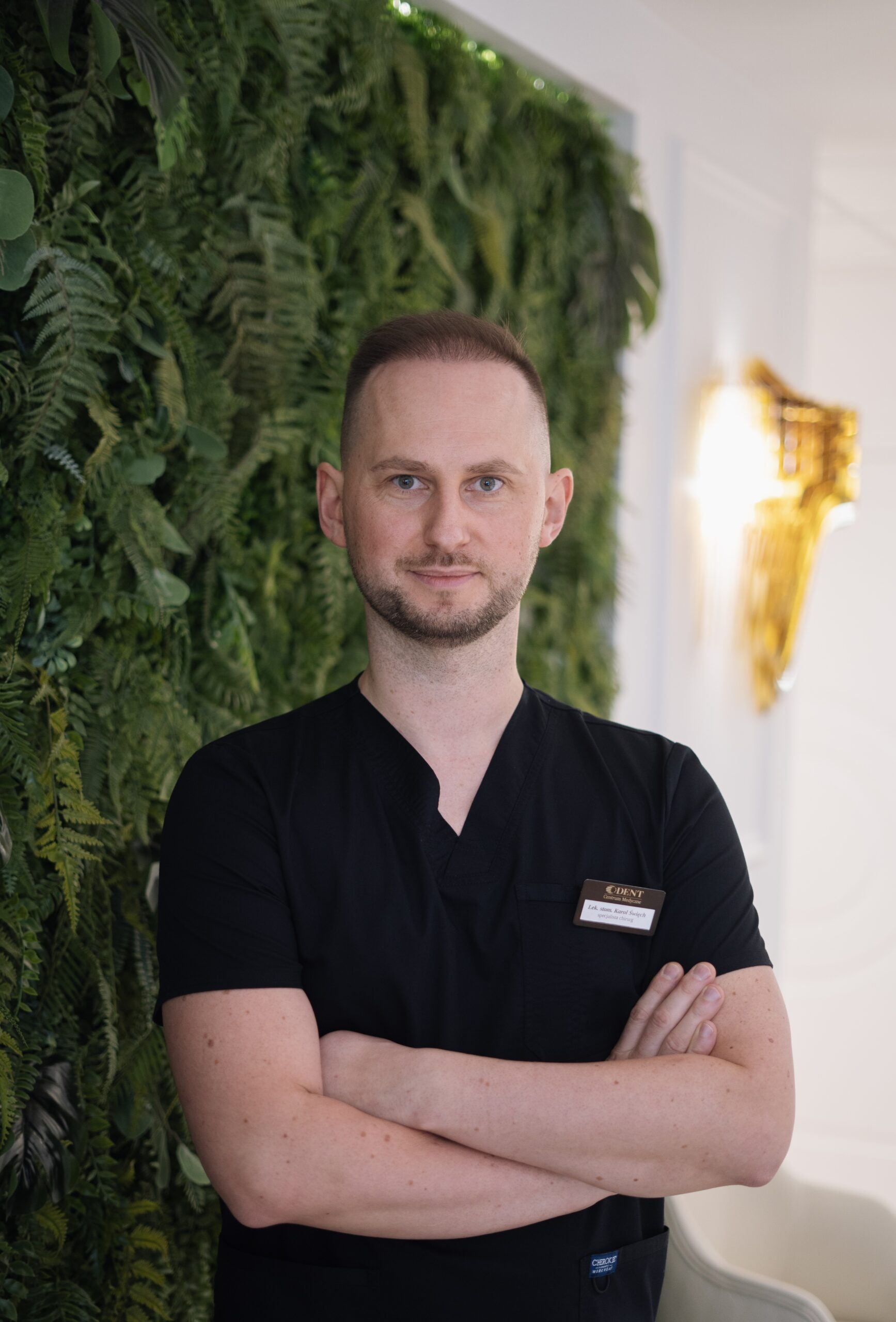Periodontology
We provide a comprehensive treatment of chronic periodontitis

ODENT Medical Center in Warsaw offers services in dentistry, orthodontics and implantology.
One of our fields of expertise is also periodontology, i.e. dealing with diseases of gums and periodontium – tissues adjacent to the tooth.
Periodontal diseases may develop for years before the patient can notice the problem. For a professional diagnosis and therapy, come and see us in our dental surgeries in Warsaw.
Whom does the problem of periodontal diseases concern?
Periodontal diseases may affect the young and elderly alike. In most patients, a periodontal disease is caused by incorrect oral hygiene, smoking tobacco or chronic stress. Malocclusion or mouth breathing may also have a considerable effect. Sometimes, genetic and pathogenic factors, such as diabetes, underlie the development of periodontitis.
When
we can help you?

Come and visit us at our Medical Center if you have any of the symptoms below:
- bleeding gums,
- swollen gums,
- a gap between the tooth and the gum (gingival pocket),
- bad breath or bad taste in your mouth,
- calculus,
- uncovered roots due to atrophy of gums and bone,
- loose teeth (periodontitis),
- shifted teeth (inclination, greater interdental gaps).
What type of treatment can we offer you at our Medical Center?
- periodontology consultation,
- X-ray diagnostics,
- treatment of gum and mucous membrane inflammation,
- histopathological analysis,
- open dental curettage,
- closed dental curettage,
- frenuloplasty,
- bone augmentation,
- splinting of loose teeth
Inadequate oral hygiene presents the bacteria residing on dental plaque with an opportunity to thrive on your gums and teeth. Accumulating plaque develops into calculus which, with poor oral hygiene, forms deposit build-ups pressing the gums and creating pathological gingival pockets.
Treatment stages:
Treatment stages:
We start the treatment with professional cleaning. In the dental surgery, we thoroughly clean the surfaces of the teeth and roots. The patient is instructed how to clean the teeth properly to get rid of the bacteria. Sometimes it is necessary to apply pharmacological therapy.
The next stage of the treatment comprises specialist cleaning of gingival pockets and smoothing out the root surfaces, which allows to reduce the adhesion of bacteria and makes the pockets shallower (the so-called open and closed curettage).
In the event of an advanced periodontitis, we may need to conduct a surgical procedure, during which, after uncovering the gums and cleaning the roots, we apply preparations reconstructing the lost tissues, e.g. bone-restoring BIO-OSS and periodontium-regenerating EMDOGAIN.

Benefits of preventing and treating
periodontal diseases:
periodontal diseases:
Periodontal treatment
does not have to be a necessity!
does not have to be a necessity!

How can I prevent periodontal diseases?
The most effective way to prevent periodontal diseases is a daily, thorough oral hygiene, i.e.:
- Regular and thorough cleaning of the teeth, flossing, rinsing with mouthwash (you are able to remove soft dental plaque by yourself during brushing and flossing your teeth).
- If you notice any alarming symptoms, such as: pain or red and bleeding gums, see your dentist at once.
- Remember about regular appointments with your dentist (check-up, treatment of dental caries).
- Professional cleaning (scaling and sandblasting) should be performed in a dental surgery twice a year.
better prevention than cure!
Frequently asked questions
FAQ
1. What is periodontitis?
Periodontitis , or inflammation of periodontium, is a disease which, if untreated, may lead to loss of teeth. It develops as a result of a chronic inflammation caused by the bacteria residing in the place where the tooth meets the gingiva. The bacterial flora and food residues form plaque, which, if not cleaned regularly, changes into calculus. Dental calculus (or tartar) first builds up at the verge of the gum and then goes down the tooth, towards the root, and damages the gum soft tissue. With time, periodontitis develops and, if untreated, attacks the tissues anchoring the teeth in the jaw bone, making the teeth loose or even causing tooth loss.
2. Where does calculus come from?
Dental calculus is a calcified dental plaque. It develops as a result of poor oral hygiene. Dental plaque is soft at first, thus easy to remove when you brush your teeth. However, if it is given time to harden up, deposits of tartar build up and it is necessary to see a dentist who will remove it by means of scaling and sandblasting performed with specialist equipment.
Dental prophylaxis (scaling and sandblasting) at the dentist's office should be performed twice a year. We encourage you to visit our ODENT Warsaw-Wola Dental Centre on a regular basis.
3. What curettage is?
Curettage is a treatment performed under local anaesthesia, e.g. computer-controlled The Wand, to clean and reduce the depth of pathological gingival pockets. There are two types of curettage: closed and open.
Closed curettage – recommended for patients whose gingival pockets are 5mm deep at the maximum. The dentist removes calculus and other infected gingival tissues from the pockets. Once the pockets have been cleaned, the inflammation subsides.
Open curettage – recommended for patients whose gingival pockets are more than 5mm deep. The doctor trims the gums and exposes the tissues underneath, thanks to which the access is gained to the roots and root-adjacent bone. The dental roots are cleaned. Often it is necessary to apply preparations restoring dental tissues. After the procedure, the opening is sutured.

Once you have completed the form, we will respond within 60 minutes during clinic hours.
-
Opening hours
Mon-Fri: 8:00 - 21:00
Saturday: 8:00 - 15:00
-
st. Grzybowska 85
00-844 Warsaw



